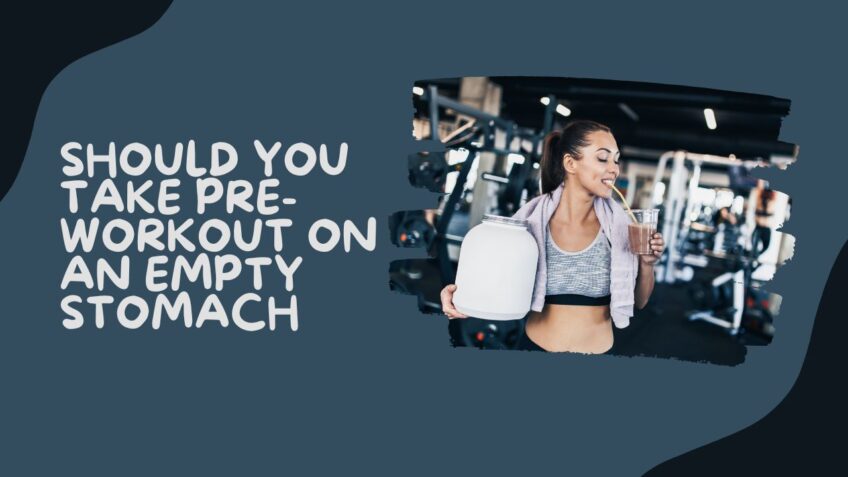Should You Take Pre Workout On An Empty Stomach

Imagine this: the sun is barely peeking over the horizon, painting the sky in hues of soft pink and orange. You're laced into your running shoes, the quiet hum of the pre-dawn world your only companion. Today's the day you're going to crush that personal best. But wait, a question lingers – should you down that pre-workout concoction before anything else, or is a bite to eat in order?
The debate surrounding taking pre-workout on an empty stomach is a common one, and understanding the nuances is crucial for optimizing your workout and avoiding potential pitfalls. This article dives into the pros, cons, and essential considerations to help you make the best choice for your body and fitness goals.
The Appeal of the Empty Stomach Approach
For some, the idea of taking pre-workout on an empty stomach is alluring. It promises a faster absorption rate, potentially leading to a quicker surge of energy and enhanced focus. This perceived speed boost can be particularly appealing for those squeezing in early morning workouts or needing an immediate kickstart after a long day.
Faster Absorption: The Theoretical Advantage
The theory behind this approach is simple: with no food to compete with, the ingredients in your pre-workout – caffeine, beta-alanine, citrulline, and others – are absorbed more rapidly into the bloodstream. This rapid absorption could translate to a more immediate and intense effect, allowing you to feel the benefits sooner and potentially push harder during your workout.
A Matter of Personal Preference and Timing
Some individuals simply prefer the feeling of working out on an empty stomach. They find that eating too close to a workout can lead to digestive discomfort, sluggishness, or even nausea. For these individuals, the potential benefits of faster absorption outweigh the risks, making an empty stomach the ideal choice.
The Potential Pitfalls: Why Caution is Key
While the idea of a rapid energy boost sounds appealing, taking pre-workout on an empty stomach isn't without its risks. Potential side effects range from mild discomfort to more significant health concerns, depending on the individual and the specific ingredients in the pre-workout supplement.
Gastrointestinal Distress: A Common Complaint
One of the most common side effects of taking pre-workout on an empty stomach is gastrointestinal distress. This can manifest as nausea, stomach cramps, bloating, or even diarrhea. This is particularly true for individuals with sensitive stomachs or those who are prone to digestive issues.
The Blood Sugar Rollercoaster: A Potential Energy Crash
Many pre-workout supplements contain stimulants like caffeine, which can cause a rapid spike in blood sugar. On an empty stomach, this spike can be even more pronounced, leading to a subsequent crash. This crash can leave you feeling fatigued, irritable, and unable to complete your workout effectively.
Increased Anxiety and Jitters: Amplified Side Effects
The effects of stimulants, such as caffeine, can be amplified when taken on an empty stomach. This can lead to increased anxiety, jitters, and an elevated heart rate. For individuals prone to anxiety or heart palpitations, this can be particularly problematic.
Nutrient Deficiencies: Exacerbated Risks
Consistently taking pre-workout on an empty stomach can also exacerbate existing nutrient deficiencies. Without food to help buffer the effects, certain ingredients can deplete essential vitamins and minerals, potentially leading to long-term health issues.
Navigating the Middle Ground: Strategies for Success
So, what's the best approach? The answer, as with most things related to health and fitness, is that it depends. However, there are some strategies you can employ to mitigate the risks and maximize the benefits.
Start Slow: Assess Your Tolerance
If you're considering taking pre-workout on an empty stomach, start with a small dose and gradually increase it as your tolerance allows. Pay close attention to how your body responds and adjust accordingly. Discontinue use if you experience any adverse side effects.
Choose Wisely: Opt for Quality Ingredients
Not all pre-workout supplements are created equal. Look for products with high-quality ingredients and avoid those containing excessive amounts of stimulants or artificial sweeteners. Opt for natural alternatives whenever possible.
Hydrate Diligently: Stay Well-Hydrated
Dehydration can exacerbate the side effects of pre-workout supplements. Drink plenty of water before, during, and after your workout to stay adequately hydrated. Proper hydration can help minimize gastrointestinal distress and prevent energy crashes.
Consider a Small, Easily Digestible Snack
Instead of taking pre-workout on a completely empty stomach, consider consuming a small, easily digestible snack about 30 minutes beforehand. Options like a banana, a handful of berries, or a small piece of toast can provide a buffer without causing digestive discomfort.
Listen to Your Body: The Most Important Rule
Ultimately, the best approach is to listen to your body and pay attention to how it responds. Experiment with different strategies and find what works best for you. If you experience any negative side effects, discontinue use or adjust your approach.
Expert Opinions and Scientific Evidence
While anecdotal evidence abounds, it's important to consider expert opinions and scientific evidence when making informed decisions about your health and fitness. Consulting with a registered dietitian or certified personal trainer can provide personalized guidance and ensure that you're making safe and effective choices.
According to the National Institutes of Health (NIH), while some studies suggest potential benefits of pre-workout supplements, more research is needed to fully understand their long-term effects. The NIH also emphasizes the importance of carefully reviewing ingredient lists and being aware of potential interactions with medications or other supplements.
Furthermore, the Academy of Nutrition and Dietetics recommends prioritizing whole foods over supplements whenever possible. A well-balanced diet that provides adequate energy and nutrients is often sufficient to fuel workouts without the need for pre-workout supplements.
Conclusion: Informed Choices for Optimal Performance
Taking pre-workout on an empty stomach can be a tempting shortcut to enhanced performance, but it's essential to weigh the potential benefits against the risks. By understanding the science, listening to your body, and making informed choices, you can optimize your workouts and achieve your fitness goals safely and effectively. Remember, consistency and a balanced approach are key to long-term success.
So, next time you're lacing up your shoes at dawn, take a moment to consider what will truly fuel your best performance. A thoughtful approach, tailored to your individual needs, will always be more effective than a quick fix. Happy training!







![Should You Take Pre Workout On An Empty Stomach Can You Take Pre Workout On An Empty Stomach? [Is it a Bad Idea?] - Pre](https://i0.wp.com/preworkoutguide.com/wp-content/uploads/2022/07/can-you-take-pre-workout-on-an-empty-stomach.png?w=1100&ssl=1)










